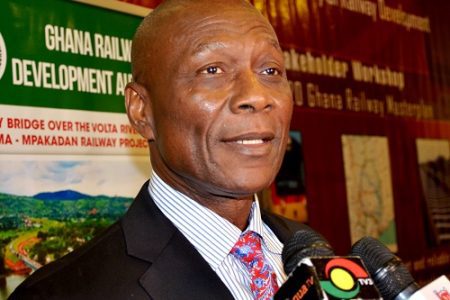The African Export-Import Bank (Afreximbank) is providing $1 million to Ghana for a feasibility studies towards the Bank’s support to railways development in the country.
The feasibility study is to bring on stream an estimated asset of $3.5 billion for railway rehabilitation and development to support economic activities, including the facilitation of the movement of people and goods.
The Bank indicated that the $1 million will be provided to the Ghana Railway Company Limited as a project preparation facility for the Western corridor railway line.
Doing so, was to enable the Bank to understand the financial and technical assistance that it could provide to Ghana and attract more private investment of up to $3.5 billion for its railways development and rehabilitation .
To this effect, Ghana signed an agreement for the $1m feasibility studies with the Afreximbank on the sidelines of the Bank’s 2023 annual meetings in Accra, which was part of six agreements signed on the day.
Ghana requires about $30 billion to build about 4,000 kilometres of rail network across the country.
About 75%of the proposed 4,000km of rail network was yet to be constructed.
The current government had invested $2 billion in the sector through various forms of financing programmes.
A kilometre of railway line is $5 million.
The $2 billion investment in the sector had accounted for the construction of the 97km Tema-Mpakadan railway line which was near completion, the 80km railway line from Takoradi to Huni Valley via Nsuta and Tarkwa, as well as the ongoing six-kilometre double line from Kaase to Adum in Kumasi.
The Railway Master Plan, first delivered in 2013 and upgraded in 2020, has been successfully adopted as the blueprint for the development of the country’s rail network.
The Master Plan is one tool to guide the country to construct a rail network that will link every city and town by the year 2050 to facilitate the shipment of goods such as cocoa, manganese, bauxite, as well as passengers, to various national and international markets.
No train has run on the Kantamanto–Nsawam or the Accra–Tema lines since March 20, 2020, although they were once blistering rail lines that served traders and commuters on the eastern and the western sides of the capital
Executive Vice-President of the Bank Kanyao Awani, said the feasibility study was critical to the success of the project.
“Many a time when you’re doing a project, you need to do some development work to bring the project to bankability before you send it to your bank and that’s what we’re doing with this facility,” Ms Awani said.
“The government of Ghana is looking for project finance for the Western corridor railway project, but we have to do the feasibility studies first, including technical studies to bring the project to bankability,” she added.
She explained that the feasibility studies would adopt an innovative demand- driven non-recourse model to ensure the commercial viability and financial self-sustainability of the project, which should not rely on government subsidies.
Once successfully implemented, the project would serve as a blue print that the Bank would replicate in other member countries across other trade-enabling infrastructure, the Executive Vice President said.
Ken Ofori-Atta, Finance Minister, underscored the essence of conducting the feasibility studies in attracting not only funds from the Bank, but other private sector investment for railways development to support economic activities.
“Our railway capacity is about $3.5m, but a lot of are not working. When we do this feasibility studies, Afreximbank and other private investors can support us with the rehabilitation and other railway projects,” Mr Ofori-Atta said.
The Western corridor railway project, which includes the associated infrastructure, training and operations and maintenance management is to transform Ghana’s existing rail network into a modern, robust and integrated railway system.
It is noted to have huge potentials for haulage of both liquid and bulk cargo, and would run from the Port of Takoradi to Huni Valley to Obuasi, including the branch line from Dunkwa to Awaso, to Nyinahin and to Eduadin.
Other pacts signed by the Bank included one with the government of Malawi and ARISE Integrated Industrial Platforms (IPP) – a $900m agreement for the development of two industrial parks and economic zones in Lilogwe and Blantyre (Malawi), which is to create some 200,000 direct and indirect jobs.
In addition, the Bank and Malawi had an agreement to address infrastructure gaps with identified projects for quick implementation that is expected to generate some investment, exceeding $1.5 billion.
There was the signing of another agreement between the Bank and ARISE IPP for a $400m global facility (part of a proposed $1 billion facility) for the development of industrial parks and special economic zones in some African countries.
The Bank also signed a Memorandum of Understanding (MoU) with the government of Bahamas for a Afro-Caribbean marketplace pilot project, aimed at promoting and distributing African and Caribbean products to other parts of the world.
- Trump slaps tariffs: Ghana, UK-10%, EU-20%, others-50% - 2 April 2025
- BoG policy rate hike: MPC’s 3-2 vote and reasons - 2 April 2025
- Painter accused of stealing BoG cables granted GH₵1m bail - 2 April 2025

